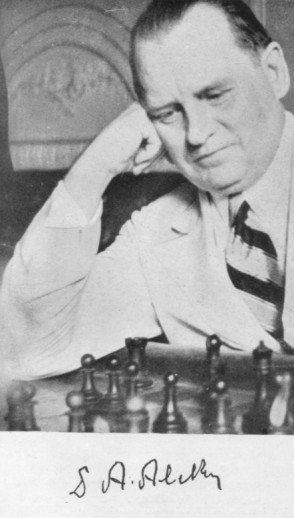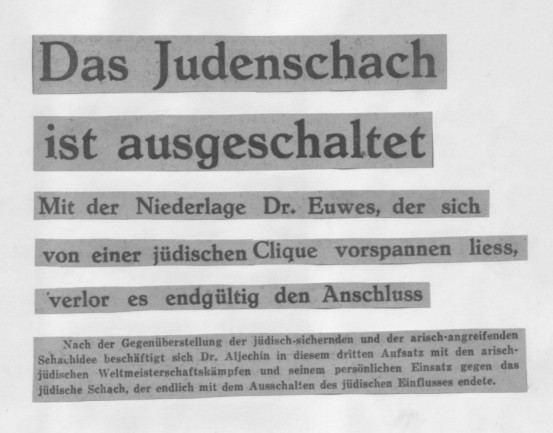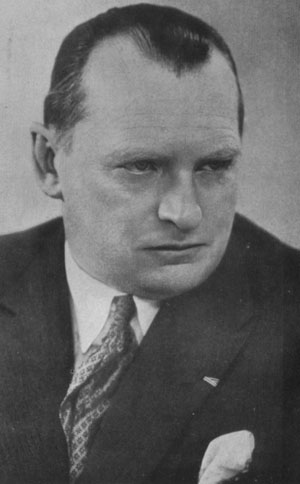
Edward Winter

In March 1941 a series of articles under the name of Alexander Alekhine appeared in Pariser Zeitung, a newspaper published in the French capital by the occupying German forces. Entitled ‘Aryan and Jewish Chess’, the articles claimed that Jews had had a destructive effect on the development of the game. Three brief extracts will give the flavour:
Much of the material was subsequently reprinted, though with considerable textual variants, in Deutsche Zeitung in den Niederlanden and Deutsche Schachzeitung. The magazine CHESS printed extensive English translations (of the Deutsche Schachzeitung version), as did Horowitz and Rothenberg’s 1963 book The Personality of Chess. However, it was not until 1986 that a complete English version of the original Pariser Zeitung articles became available (Alekhine Nazi Articles, an excellent privately printed booklet edited by Kenneth Whyld). In recent years there have also been two reproductions of the original German, by Wolfgang Kubel (1973) and Herbert Griesshammer (1983).

An extract from Deutsche Zeitung in den Niederlanden
Condemnation of the articles came from many notable sources. The November 1945 CHESS (page 28) quoted from De Waarheid a denunciation of Alekhine by G.C.A. Oskam: ‘His libellous articles have filled me with sorrow. They were written by a miserable collaborator, by a mean profiteer; they breathe lies and fraud, the necessary elements of racial hatred; they are dictated by the qualities present in the person of a double traitor ...’ The same magazine published an anti-Alekhine letter from Ossip Bernstein which was not without over-the-fence gossip: ‘I refrain from giving further disgusting details about his behaviour. It could be added that he adopted the Nazi salute “Heil Hitler” with outstretched arm.’
Alekhine’s first disavowal of the articles appears to date from just after the liberation of Paris (and not from just after the end of the War, as sometimes alleged even today). The December 1944 BCM (pages 274-275) and the January 1945 CHESS (page 53) both reported Alekhine’s statement in a published interview (News Review, 23 November 1944) that while in France ‘he had to write two chess articles for the Pariser Zeitung before the Germans granted him his exit visa ... Articles which Alekhine claims were purely scientific were rewritten by the Germans, published and made to treat chess from a racial viewpoint.’
After his invitation to the London, 1946 tournament was withdrawn because of his war record, Alekhine wrote a long open letter to the organizer, W. Hatton-Ward, which was widely published at the time. With regard to the articles, he stated:
‘Among the heap of monstrosities published by the Pariser Zeitung appeared insults against the members of the Committee which organized the 1937 match: and the Dutch Chess Federation even lodged a protest on this matter with Post. At that time I was absolutely powerless to do the one thing which would have clarified the situation, to declare that the articles had not been written by me ... For three years, until Paris was liberated, I had to keep silent. But from the first opportunity I tried in interviews to show up the facts in their true light. Of the articles which appeared in 1941 during my stay in Portugal and which I learnt about in the Deutsche Schachzeitung, nothing was actually written by me. I had submitted material dealing with the necessary reconstruction of the FIDE (the International Chess Federation) and a critique, written well before 1938, of the theories of Lasker and Steinitz. I was surprised when I received letters from Messrs Helms and Sturgis at the reaction which these articles – purely technical – had provoked in America and I replied to Mr Helms accordingly. Only when I knew what incomparably stupid lucubrations had been created in a spirit imbued with Nazi ideas did I realize what it was all about. But I was then a prisoner of the Nazis and our only hope of preservation was to keep silent. Those years ruined my health and my nerves and I am even surprised that I can still play chess.’
(The above is the CHESS translation. In the BCM Helms came out as ‘Helsus’ and ‘1939’ was given rather than 1938.)
Alekhine wrote a further denial on page xx of his last book, the posthumous !Legado!:
‘Once more I insist on repeating that which I have published on several occasions: that is, that the articles which were stupid and untrue from a chess point of view and which were printed signed with my name in a Paris newspaper in 1941 are a falsification. It is not the first time that unscrupulous newspapers have abused my name in order to publish inanities of that kind but in the present case what was published in Pariser Zeitung is what has caused me the most grief, not only because of its content but also precisely because it is impossible for me to rectify it ... Colleagues know my sentiments and they know perfectly well how great is the esteem in which I hold their art and that I have too elevated a concept of chess to become entangled in the absurd statements poured out by the above-mentioned Parisian newspaper.’
Thus Alekhine’s line of defence was not consistent. Sometimes he claimed to have written nothing, but on other occasions said that the anti-Jewish slant had been added by others. The latter possibility is unlikely; once the anti-Jewish slant is taken away there is hardly anything left.

Alexander Alekhine
Two widely-read reference books, Golombek’s The Encyclopedia of Chess (London, 1977) and Hooper and Whyld’s The Oxford Companion to Chess (Oxford, 1984), state that upon the death of Alekhine’s widow in 1956 the articles were found in Alekhine’s own handwriting. In both cases the authors subsequently gave their source for this information: Brian Reilly, then the Editor of the BCM, had told them in 1956 that he had just seen the articles. However, this is denied by Reilly, whose eagerly-awaited biography of Alekhine will doubtless provide his account of the matter. [Brian Reilly died in 1991, and his work on Alekhine has not been published.] Another alleged sighting of the articles also has a curious twist. In the May 1986 Europe Echecs (pages 300-301) Jacques Le Monnier reported that before her death Grace Alekhine had passed a number of her late husband’s notebooks to a friend (unnamed). In 1958 Le Monnier was given access to the material and found, word for word and in Alekhine’s own handwriting, the text of the first anti-Semitic article, which had appeared in Pariser Zeitung of 18 March 1941. The word ‘Jew’ was almost invariably underlined, Le Monnier reported. This testimony seems watertight until one compares it with what Le Monnier wrote about the articles on page 24 of his 1973 book 75 parties d’Alekhine: ‘Alekhine stated several times that “not a word had been written by him”. It will never be known whether Alekhine was behind these articles or whether they were “manipulated” by the editor of the Pariser Zeitung, a Czech player well known at the time in Parisian chess circles.’ These are, to say the least, surprising words from someone who, a dozen or so years later, was to declare that he himself had seen one anti-Semitic article in Alekhine’s own handwriting. (In passing it my also be wondered why Alekhine and his wife refrained from destroying such incriminating material as may have been in their possession after the fall of the Third Reich.)
Such inconsistencies will be welcomed by defenders of Alekhine, many of whom have suggested that, being forced, for his own and his wife’s safety, to write anti-Semitic material, the then world champion deliberately made it ridiculous and inaccurate. The original Pariser Zeitung publication contained many elementary misspellings of proper names (‘Marschall’, ‘Andersen’, ‘Pilsburry’, etc. ). There is a reference to the match between La Bourdonnais and ‘Macdonald’ (instead of McDonnell) and to a ‘Polish Jew’ named ‘Kienezitzky’. (Kieseritzky is meant, although he was apparently neither Polish nor Jewish.) Some mistakes were corrected in the Deutsche Schachzeitung reprint, as were factual errors like the suggestion in Pariser Zeitung that Schlechter was a Jew. But the theory that Alekhine tried to signal his insincerity is mere guesswork which is not even supported by any claim to that effect from Alekhine himself. The wrong spellings might just as easily be put down to a Pariser Zeitung typesetter’s difficulty in reading Alekhine’s idiosyncratic handwriting.
Fresh documentation has recently come to light which considerably strengthens the case against Alekhine. Pablo Morán has discovered two Madrid publications dated 3 September 1941 which contain interviews given by Alekhine just before his departure for the Munich, 1941 tournament. El Alcázar reported:
‘He [Alekhine] added that in the German magazine Deutsche Schachzeitung and the German daily Pariser Zeitung, currently published in Paris, he had been the first to deal with chess from the racial point of view. In these articles, he said, he wrote that Aryan chess was aggressive chess, that he considered defence solely to be the consequence of earlier error, and that, on the other hand, the Semitic concept admitted the idea of pure defence, believing it legitimate to win this way.’
Alekhine told Valentín González of Informaciones about his intention to give lectures ‘about the evolution of chess thought in recent times and the reasons for this evolution. There would also be a study of the Aryan and Jewish kinds of chess.’ Moreover, Alekhine was quoted as saying that he was not in favour in the United States and England ‘as a result of some articles I wrote in the German press and some games I played in Paris during the last winter – against 40 opponents – for the German Army and Winter Relief.’ When asked which players he most admired Alekhine’s published reply was: ‘... I must stress the greatest glory of Capablanca, which was to eliminate the Jew Lasker from the world chess throne.’
The Nazi articles affair is one of chess history’s most notorious scandals and intriguing mysteries. Although, as things stand, it is difficult to construct much of a defence for Alekhine, only the discovery of the articles in his own handwriting will settle the matter beyond all doubt.
The above article first appeared on pages 68-70 of the 2/1989 New in Chess. On page 6 of the 4/1989 issue Jacques Le Monnier made a brief reply. It consisted of a fuller extract from the Europe Echecs article in which he had said that he had seen an article in Alekhine’s own handwriting, as well as the following remark:
‘I would not change a word. Alekhine’s notebooks are private documents and French law is categorical in this respect. They will enter in the public domain 60 years after the author’s death, i.e. in 2006. After this date historians and researchers may consult them, provided that Alekhine’s heirs and the owners of the notebooks agree.’
In C.N. 1920 we quoted this and commented: ‘It is a pity that Mr Le Monnier did not answer our straightforward point: if in 1958 he saw an article in Alekhine’s own hand, why, some 15 years later, did he write that ‘it will never be known whether Alekhine was behind these articles …’?
C.N.s 3605, 3606 and 3617 reverted to the Alekhine affair, and the third of these items mentioned that French copyright law changed in the 1990s, with the result that the notebooks would not enter the public domain until 1 January 2017.
Complete English translations of Alekhine’s articles in El Alcázar and Informaciones were given in C.N. 1455 and are available as a separate feature article.
To the Chess Notes main page.
To the Archives for other feature articles.
Copyright: Edward Winter. All rights reserved.